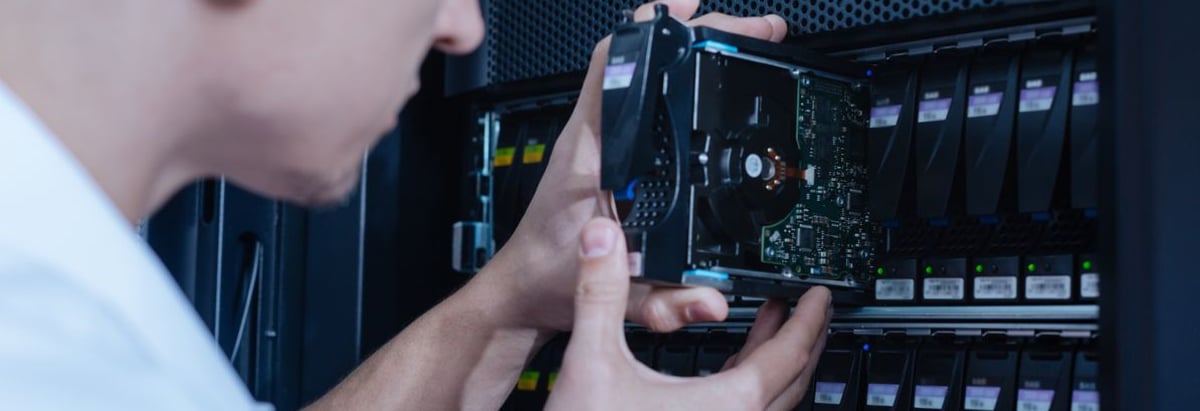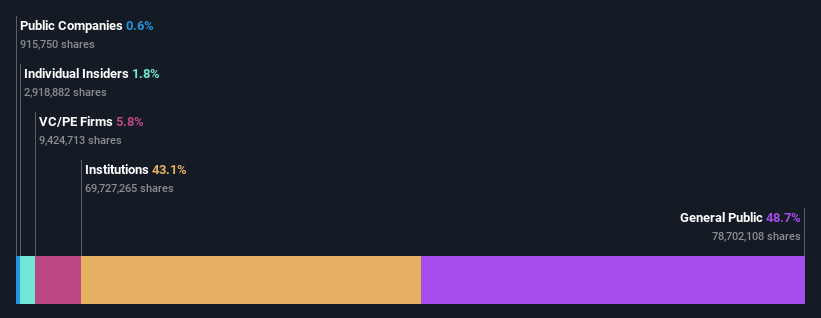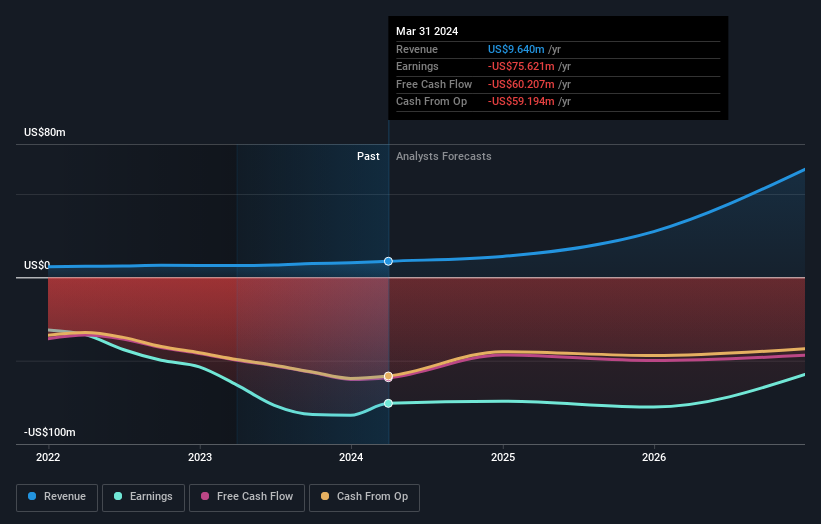Stock Analysis
- United States
- /
- Software
- /
- NYSE:QBTS
D-Wave Quantum Inc. (NYSE:QBTS) most popular amongst individual investors who own 49% of the shares, institutions hold 43%

Key Insights
- Significant control over D-Wave Quantum by individual investors implies that the general public has more power to influence management and governance-related decisions
- 50% of the business is held by the top 23 shareholders
- 43% of D-Wave Quantum is held by Institutions
A look at the shareholders of D-Wave Quantum Inc. (NYSE:QBTS) can tell us which group is most powerful. And the group that holds the biggest piece of the pie are individual investors with 49% ownership. That is, the group stands to benefit the most if the stock rises (or lose the most if there is a downturn).
Meanwhile, institutions make up 43% of the company’s shareholders. Large companies usually have institutions as shareholders, and we usually see insiders owning shares in smaller companies.
Let's take a closer look to see what the different types of shareholders can tell us about D-Wave Quantum.
Check out our latest analysis for D-Wave Quantum

What Does The Institutional Ownership Tell Us About D-Wave Quantum?
Institutions typically measure themselves against a benchmark when reporting to their own investors, so they often become more enthusiastic about a stock once it's included in a major index. We would expect most companies to have some institutions on the register, especially if they are growing.
As you can see, institutional investors have a fair amount of stake in D-Wave Quantum. This can indicate that the company has a certain degree of credibility in the investment community. However, it is best to be wary of relying on the supposed validation that comes with institutional investors. They too, get it wrong sometimes. It is not uncommon to see a big share price drop if two large institutional investors try to sell out of a stock at the same time. So it is worth checking the past earnings trajectory of D-Wave Quantum, (below). Of course, keep in mind that there are other factors to consider, too.

D-Wave Quantum is not owned by hedge funds. Looking at our data, we can see that the largest shareholder is Public Sector Pension Investment Board with 37% of shares outstanding. Meanwhile, the second and third largest shareholders, hold 5.8% and 1.0%, of the shares outstanding, respectively.
A closer look at our ownership figures suggests that the top 23 shareholders have a combined ownership of 50% implying that no single shareholder has a majority.
While studying institutional ownership for a company can add value to your research, it is also a good practice to research analyst recommendations to get a deeper understand of a stock's expected performance. Quite a few analysts cover the stock, so you could look into forecast growth quite easily.
Insider Ownership Of D-Wave Quantum
The definition of company insiders can be subjective and does vary between jurisdictions. Our data reflects individual insiders, capturing board members at the very least. Management ultimately answers to the board. However, it is not uncommon for managers to be executive board members, especially if they are a founder or the CEO.
I generally consider insider ownership to be a good thing. However, on some occasions it makes it more difficult for other shareholders to hold the board accountable for decisions.
We can report that insiders do own shares in D-Wave Quantum Inc.. As individuals, the insiders collectively own US$3.6m worth of the US$200m company. Some would say this shows alignment of interests between shareholders and the board. But it might be worth checking if those insiders have been selling.
General Public Ownership
The general public, who are usually individual investors, hold a 49% stake in D-Wave Quantum. While this size of ownership may not be enough to sway a policy decision in their favour, they can still make a collective impact on company policies.
Private Equity Ownership
With a stake of 5.8%, private equity firms could influence the D-Wave Quantum board. Some investors might be encouraged by this, since private equity are sometimes able to encourage strategies that help the market see the value in the company. Alternatively, those holders might be exiting the investment after taking it public.
Next Steps:
I find it very interesting to look at who exactly owns a company. But to truly gain insight, we need to consider other information, too. For instance, we've identified 5 warning signs for D-Wave Quantum (2 are concerning) that you should be aware of.
But ultimately it is the future, not the past, that will determine how well the owners of this business will do. Therefore we think it advisable to take a look at this free report showing whether analysts are predicting a brighter future.
NB: Figures in this article are calculated using data from the last twelve months, which refer to the 12-month period ending on the last date of the month the financial statement is dated. This may not be consistent with full year annual report figures.
Valuation is complex, but we're helping make it simple.
Find out whether D-Wave Quantum is potentially over or undervalued by checking out our comprehensive analysis, which includes fair value estimates, risks and warnings, dividends, insider transactions and financial health.
View the Free AnalysisHave feedback on this article? Concerned about the content? Get in touch with us directly. Alternatively, email editorial-team (at) simplywallst.com.
This article by Simply Wall St is general in nature. We provide commentary based on historical data and analyst forecasts only using an unbiased methodology and our articles are not intended to be financial advice. It does not constitute a recommendation to buy or sell any stock, and does not take account of your objectives, or your financial situation. We aim to bring you long-term focused analysis driven by fundamental data. Note that our analysis may not factor in the latest price-sensitive company announcements or qualitative material. Simply Wall St has no position in any stocks mentioned.
About NYSE:QBTS
D-Wave Quantum
Develops and delivers quantum computing systems, software, and services worldwide.
Limited growth with imperfect balance sheet.

